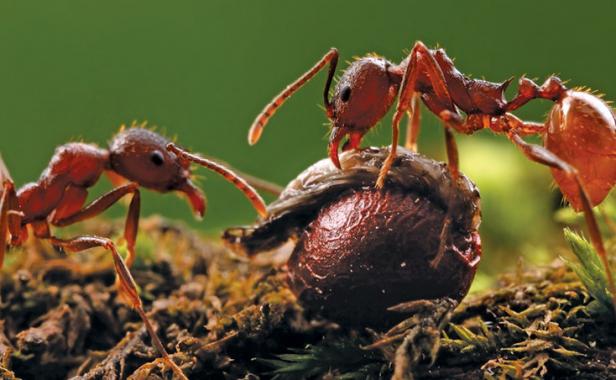The tiny creatures are the ‘unsung heroes’ that keep soils healthy and underpin all life on land
Pesticides are causing widespread damage to the tiny creatures that keep soils healthy and underpin all life on land, according to the first comprehensive review of the issue.
The researchers found the measured impacts of farm chemicals on earthworms, beetles, springtails and other organisms were overwhelmingly negative. Other scientists said the findings were alarming, given the importance of these “unsung heroes”.
The analysis warned that soil organisms are rarely considered when assessing the environmental impact of pesticides. The US, for example, only tests chemicals on honey bees, which may never come into contact with soil, an approach described as “crazy”.
A UN report published in December found that the future looked “bleak” for soils without urgent action to halt degradation, given that it takes thousands of years for new soils to form. Soils are thought to contain nearly a quarter of all the planet’s biodiversity.
Nathan Donley, at the Center for Biological Diversity in the US and an author of the new review, said: “The level of harm we’re seeing is much greater than I thought it would be. Soils are incredibly important. But how pesticides can harm soil invertebrates gets a lot less coverage than pollinators, mammals and birds – it’s incredibly important that changes.”
“Beetles and springtails have enormous impacts on the porosity of soil and are really getting hammered, and earthworms are definitely getting hit as well,” he said. “A lot of people don’t know that most bees nest in the soil, so that’s a major pathway of exposure for them.”
Prof Dave Goulson, at the University of Sussex, UK, and not part of the study team, said: “The findings of harmful effects on soil organisms from the large majority of pesticides tested is alarming, given the vital importance of these ‘unsung heroes’ in keeping the soil healthy.”
The analysis, published in the journal Frontiers in Environmental Science, systematically reviewed nearly 400 studies of the effects of pesticides on non-target invertebrates that live at least part of their lives in the soil. It covered more than 275 species and 284 pesticides but excluded any chemicals currently banned in the US.
The studies provided more than 2,800 “tested parameters”, where a specific pesticide had been tested on a specific organism for a particular feature, such as mortality, abundance, behaviour, reproduction, and biochemical and morphological changes.
The scientists found 71% of the tested parameters showed negative effects from pesticide exposure, while 28% showed no significant effects and 1% showed positive effects. For example, 84% of the tested parameters in earthworms were negatively affected by the most common classes of insecticides. Some herbicides and fungicides also harmed earthworms.
Donley said: “It’s not just one or two pesticides that are causing harm, the results are really very consistent across the whole class of chemical poisons.” A 2012 review showed that pesticides can also harm microbial life in soils.
Review studies may be affected by so-called publication bias if researchers have tended to publish only those experiments that show a striking result. But Matt Shardlow, at the charity Buglife in the UK, said: “The answer is clear here – the distribution of outcomes in published studies is massively weighted on the negative side.”
“The high level of negative effects on reproduction across the board is one of the most concerning results they highlight,” he said. “It also transpires that fungicides are almost as bad as insecticides for soil animals. This is not surprising as earthworms, woodlice, millipedes and springtails feed largely on fungi on decaying vegetable matter.”
“We all want fertile agricultural soils, but this shows that the pesticides we are applying are assaulting the fertility of the animals that live in the soil,” Shardlow said. “If we want to protect healthy soils we do need to take soil organisms into consideration when deciding if a pesticide is safe to use.”
In the US, the only organism pesticides are tested on are honey bees, said Donley: “It’s crazy to have a single species that may never come into contact with soil in its entire life as a proxy for every terrestrial invertebrate out there. You might as well use a fish.” Pesticide regulation is generally even less strict in less developed nations, despite agriculture making up a bigger part of their economies.
Europe Union pesticide regulations do include tests on one species of mite, springtail and earthworm, and on microbial activity. Further tests on a woodlouse and symbiotic fungi are also being considered. “That’s good, but I’d still like to see more,” said Donley.
CropLife America, which represents pesticide companies, did not respond to a request for comment.


